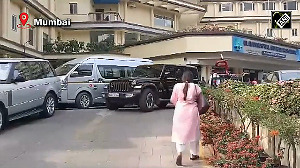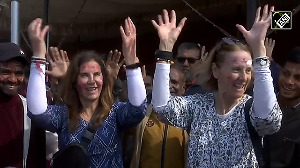 'Over time, as I kept ringing Mr Vajpayee's home, Mrs Kaul would pick up the phone sometimes and chat pleasantly with a great deal of warmth.'
'Over time, as I kept ringing Mr Vajpayee's home, Mrs Kaul would pick up the phone sometimes and chat pleasantly with a great deal of warmth.'
Rajkumari Kaul's death over the weekend brings back memories of phone conversations at a time when landline numbers were still in vogue, and Atal Bihari Vajpayee was still to become prime minister, remembers Girish Nikam.
Those were my early days in Delhi as a journalist. Having come after from stints in Mysore, Bangalore and Chennai, the capital was a challenge. Having been assigned the Bharatiya Janata Party beat, it was exciting, all right, to come face to face on a daily basis with all the stalwarts and the blossoming stalwarts of the party.
It included the tallest leaders like Atal Bihari Vajpayee, L K Advani, Murli Manohar Joshi, Sundar Singh Bhandari, K R Malkani, to name a few. And, of course, the younger set who was being carefully groomed -- Sushma Swaraj, Venkaiah Naidu, Pramod Mahajan, Arun Jaitley.
Narendra Modi was still a relatively unknown element then, who mostly remained a backroom boy.
Working for a regional group of newspapers (Eenadu and Newstime), which had no editions in the capital, it was that much more challenging to establish contacts and build on them. Unlike the capital-based newspaper correspondents, whose stories were read in the morning by the leaders, had easier access and were taken more seriously.
Nevertheless, a challenge was a challenge and since one had decided to work in the capital, there was no choice but to go all out. One way was not to miss any occasion to meet the leaders, interact with them, ask questions (sensible ones) at press conferences, and be noticed.
That done, it was also important to be in touch with the leaders on the phone (those were landline days and dozens and dozens of numbers of leaders were on one's finger tips), to get quotes or crosscheck stories inevitably late in the evenings or even night.
During the process of familiarisation with the leaders, it so happened that for some strange reasons, as it often happens inexplicably in human relationships, a rare rapport was stuck with Vajpayee.
In 1995 he was still smarting under the shadow of the towering Advani who had a vice-like grip over the party, after his successful steering of the party from the debris of 1984 (when the BJP had won just two seats in the Lok Sabha), with his rath yatras.
Vajpayee, who was then a resident of 6, Raisina Road, would be available for journalists and visitors in the evening after his nap and tea, quite freely. Or many a time at his office in Parliament, which he had as the Leader of the Opposition in the Lok Sabha. So frequent meetings, many of them unscheduled, had established a special rapport.
It was this rapport which would frequently encourage me to call up his residence at all hours in the evening and night, sometimes even after 11 pm. Once, in that late hour, Vajpayee picked up the phone himself and confirmed some news I was checking on. Only to reprimand me in his usual witty manner the next day when we met, "Nikamsaab, aap toh sote nahin ho, lekin hamein toh sone do (Nikamsaab, you don't sleep, but allow us to sleep at least)," with a twinkle in his eye and mischief in his voice.
On one of those early days of covering the BJP I had called his home late in the evening, and a female voice answered. The voice was sophisticated and gentle.
When I asked for Mr Vajpayee, she gently asked me to hold on and he came on the line. This happened again a few days later. The same sophisticated female voice this time introduced herself as "Mrs Kaul here". I let that pass, and as usual asked for Mr Vajpayee who came on the line in a while.
This happened a few more times, and the call would be taken by Mrs Kaul and I would not show any interest except to get Mr Vajpayee on the line.
One day, when I rang again, the lady picked up, and repeated "Mrs Kaul here" and as I was about to ask for Mr Vajpayee, she repeated, "Mrs Kaul here". To which I replied courteously but without any curiosity, "Yes, ma'am, I know." This was too much for her! "You don't know who I am?" she asked gently but curiously and I guess with some amusement also.
Being new to Delhi and to the BJP beat and not really up to date with the personal lives of politicians, or the gossip surrounding them, I honestly replied, "No ma'am," with a mixed sense of guilt and anxiety.
"I am Mrs Kaul, Rajkumari Kaul. Vajpayeeji and I have been friends for a long time, over 40 years. You didn't know?" she asked with a sense of amusement and wonder.
"Oh, I am sorry, ma'am, I didn't know," I mumbled. She laughed and then went on to say how Vajpayee had lived with her and her husband, Professor Kaul, all those years and about her husband who had taught at Delhi university and was now retired. I just kept mumbling through the conversation, and when it ended I apologised for my ignorance and wished her and put the phone down. I had forgotten to ask to talk to Vajpayee!!
Over time as I kept ringing Vajpayee's home, Mrs Kaul would pick up the phone sometimes and chat pleasantly with a great deal of warmth and even discuss the weather, her health and about her daughter (Namita) and granddaughter, Neha (Neharika). She would ask about my family and if I had had my lunch or tea.
Sometimes she would be worried about Neha missing school because of a scold or cough. The chat would always end up with "Girish, you should come and have tea with me some time," and I would mumble, "Sure ma'am, I will come."
As any beat reporter who is always chasing stories, I never managed to find the time to have that cup of tea with Mrs Kaul. And then Vajpayee became prime minister for 13 days in 1996, and the SPG took over. My contacts with Mrs Kaul ended with that, as she didn't have to pick up the phone anymore. And I moved on to other beats.
When I read that she was no more, memories came flooding of those numerous conversations with the gentle lady, who was just an affectionate voice for me and not a face I could associate with. And she will now remain just that.
And that cup of tea that I will never be able to have with her.
Image: June 2003, then Prime Minister Atal Bihari Vajpayee's visit to China when his foster daughter Namita Kaul Bhattacharya, left, granddaughter Neharika and son-in-law Ranjan Bhattacharya, accompanied him to the Longmen Grottoes, a series of Buddhist sculptures cut into a mountainside. Photograph: NG Han Guan/AFP/Getty Images







 © 2025
© 2025